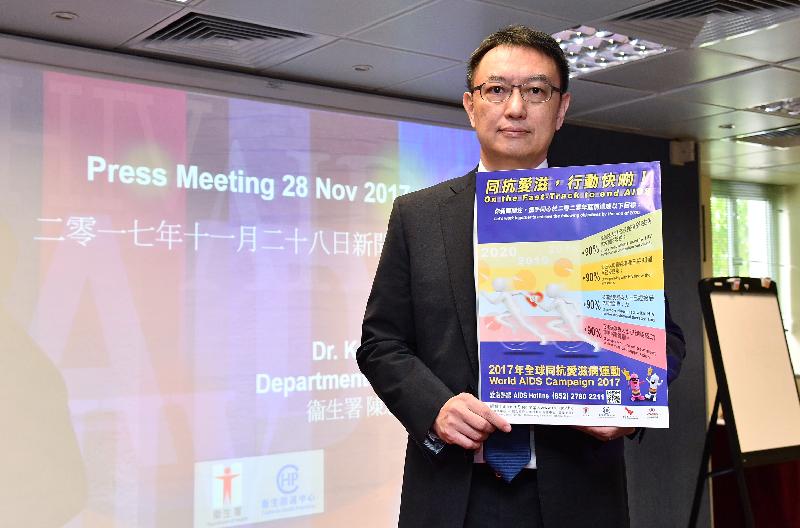153 HIV cases recorded in third quarter of 2017 (with photo)
************************************************************
Reviewing the latest HIV/Acquired Immune Deficiency Syndrome (AIDS) situation in Hong Kong at a press conference today (November 28), the Consultant (Special Preventive Programme) of the CHP, Dr Kenny Chan, said that sexual transmission remained the major mode of HIV transmission.
Dr Chan stressed the importance of proper use of condoms in reducing the risk of contracting HIV. Men who have sex with men (MSM), who dominate the epidemic, are strongly urged to use a condom for safer sex.
"HIV is the cause of AIDS and without treatment about half of HIV-infected people will progress to AIDS within 10 years. However, HIV treatment prevents AIDS and significantly prolongs survival. HIV-positive people should seek specialist care as soon as possible," he said.
Of the 153 HIV cases, comprising 129 males and 24 females, 89 acquired the infection via homosexual or bisexual contact, 24 via heterosexual contact and one via perinatal route outside Hong Kong. The routes of transmission of the remaining 39 cases have yet to be determined due to inadequate information.
These new cases were mainly reported by three major sources: public hospitals and clinics (47 cases), the DH's AIDS unit (33 cases) and Social Hygiene Clinics (SHCs) (33 cases). Among them, 116 (76 per cent) have already received HIV specialist services at the DH or the Hospital Authority (HA).
In addition, 12 new cases of AIDS were reported in the above quarter, bringing to 1 829 the total number of confirmed AIDS cases reported since 1985. Among the new cases, 67 per cent were attributed to homosexual or bisexual contact and 17 per cent to heterosexual contact.
In the above quarter, the most common AIDS-defining illness was Pneumocystis pneumonia, a kind of chest infection.
"Members of the public, particularly high-risk groups, should use condoms consistently and properly. Those with a history of unsafe sex should take an HIV antibody test early. People who inject drugs should avoid sharing needles with others and should receive methadone treatment as soon as possible," Dr Chan said.
Dr Chan also reported an update on the hepatitis A outbreak among MSM. The CHP's epidemiological investigations revealed that, as of November 17, a total of 53 hepatitis A cases affecting MSM aged from 20 to 55 had been reported since September 2015, with 37 known to be HIV-positive. Among the 53 cases, three have been recorded since August 2017.
To control the outbreak, hepatitis A vaccination was arranged in February 2017 for some 2 000 MSM patients of designated HIV clinics of the DH and the HA. Vaccination was also offered to MSM attending designated SHCs. As of November 16, a total of 2 156 doses of hepatitis A vaccines had been administered in the public sector.
"To date, the vaccination arrangements have reached their objectives and the number of MSM reported to have hepatitis A has stabilised to a low level in recent months. As the CHP's Scientific Committee on AIDS and Sexually Transmitted Infections as well as Scientific Committee on Vaccine Preventable Diseases both extended the recommendation for hepatitis A vaccination to MSM in June 2017, we advise MSM to consult their doctors on the need for vaccination," he said.
Three DH clinics, namely the Male SHCs in Wan Chai and Yau Ma Tei as well as Fanling Integrated Treatment Centre (Social Hygiene Service), will offer hepatitis A vaccination for their MSM clients as appropriate, as well as screening and treatment of sexually transmitted infections.
The public can call the DH's AIDS Hotline (2780 2211) for a free, anonymous and confidential HIV test. They may visit the DH's Virtual AIDS Office (www.aids.gov.hk), the Red Ribbon Centre (www.rrc.gov.hk), the AIDS Hotline website (www.27802211.com), the Gay Men HIV Information website (www.21171069.com) and the Harm Reduction website (www.harmreduction.gov.hk) for more information on HIV/AIDS.
They may also visit the Hepatitis A page of the CHP and its Viral Hepatitis Preventive Service for more information.
Ends/Tuesday, November 28, 2017
Issued at HKT 12:36
Issued at HKT 12:36
NNNN
Photo
Related Links
Vaccination for high-risk male attendees to control hepatitis A outbreak (with photo)
Update on hepatitis A outbreak in high-risk male groups
Review of HIV/AIDS in 2016 and update on hepatitis A in high-risk males (with photo)
187 HIV cases recorded in second quarter of 2017 (with photo)
Review of HIV/AIDS in 2017 (with photo)





